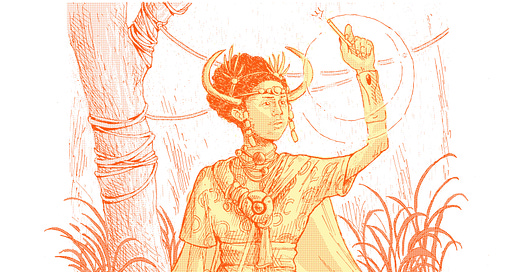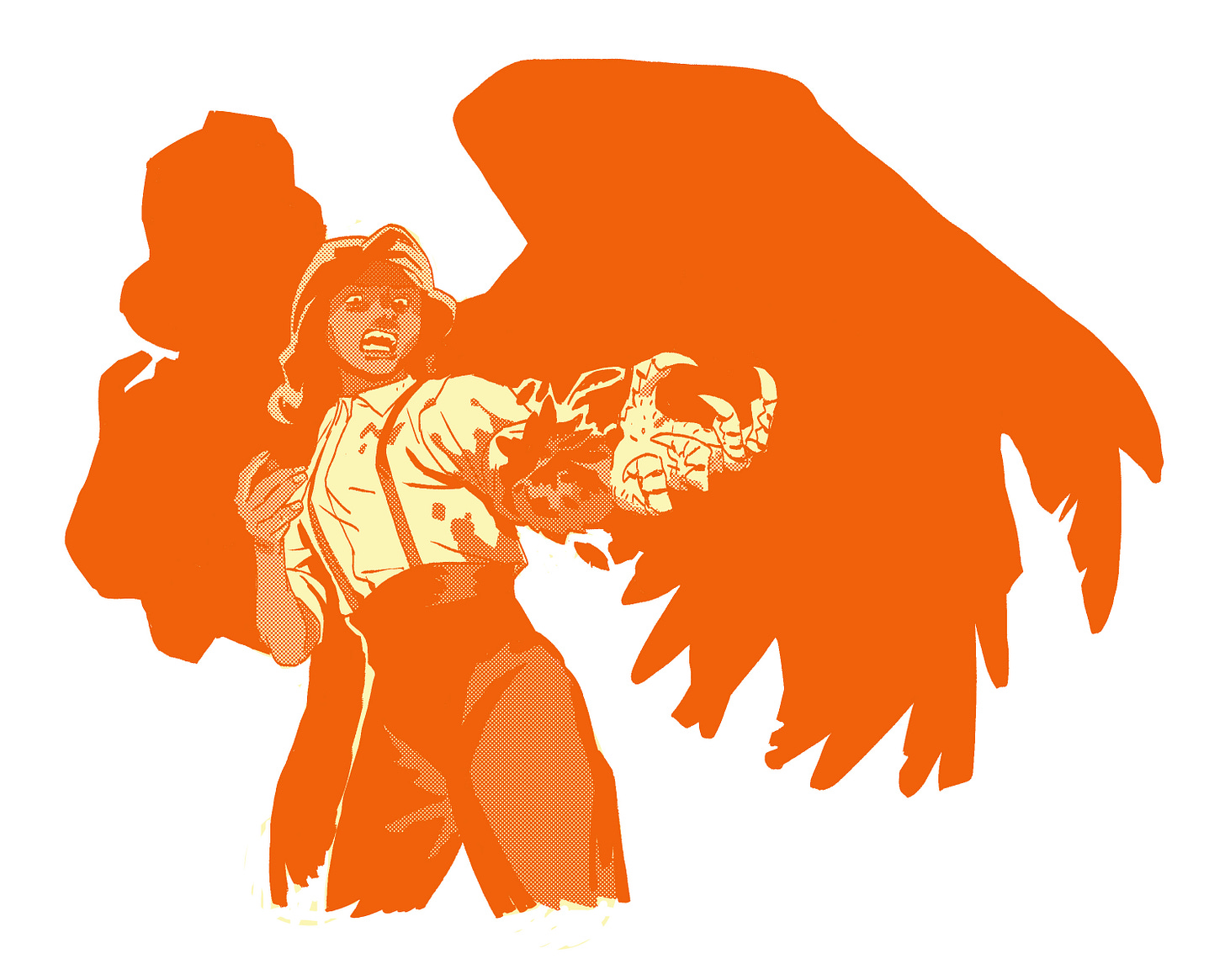In an effort to make the Cloud Empress Newsletter more Cloud Empress-focused, I’ll be sharing more Cloud Empress lore and design diaries in upcoming newsletters. Make sure to vote on what you’d like to see in the poll at the bottom of this post!
The Youth of the Lowland Wastes
By necessity, most Farmerlings live transitory lives determined by the seasons. Wander in the Summer and settle down for the wWinter. Familial ties are flexible and loose though Farmerling children are as preciously guarded as Spring saplings. Still, families break and reform constantly. Birth parents guide their children or just as often relatives and trusted community members take youth on for a season or more. When many caregivers die each Summer, their children are given to “traveling kindergartens” or taken up by kin with the resources to keep them. Groups of kids from infants to fifteen year old’s walk the Hereafter in these kindergartens, protected by heavily armed Couriers. Kindergarten Couriers teach the young what they need to know and protect the still weak from the dangers of the Imago. Provided the young are adequately fed and cared for, their rotational caregivers forge secure attachments and a network of loved ones who can be relied upon across the Lowland Wastes.
Design Diary: Power fantasies and harsh realities
Today I want to dive in and talk about how I've tried to address power fantasies in Cloud Empress. As someone who plays RPGs, board games, video games, and reads science fiction, fantasy, and comic books, my life is steeped in various power fantasies. Power fantasies are like hot tubs, comfortable but often clouded with unaddressed bacteria. Cloud Empress intentionally tries to undermine the players' relationship with power and our fantasies of becoming powerful.
Power fantasies are like hot tubs, comfortable but often clouded with unaddressed bacteria.
At their most basic level, power fantasies create feelings of excitement, agency, and freedom for those consuming or co-creating them. Our societal, economic, social, and fallible human limitations often define us. It makes sense to be attracted to narratives and stories where a character is in command of themselves and the world around them. There are so many "chosen one narratives" because these stories center the entire world’s fate around a relatable individual’s decisions.
One thing I've noticed about power fantasies is that they often seem to function as a distorted mirror through which we view our identities. We bring some of our strengths and gifts into the characters we create and love, but we are attracted to characters who compensate for our own perceived weaknesses, faults, and failings. For example, most nerd media depicts certain hyper-athletic bodies rarely representative of the diverse and equally valuable bodies of its audiences.
Power fantasies rarely upend oppressive structures of power in the narratives and worlds they exist in. As Ted Chiang notes in an Ezra Klein interview, superheroes fight to uphold the status quo, however unjust, as Chiang says, “Superheroes pretty much never do anything about injustices perpetrated by the state.” Movie revenge stories are thinly veiled (or explicit) murder sprees.
Depictions of power fantasies are especially sticky. It's common to see YouTube comments under Mad Men clips idolizing Don Draper for his suit-wearing, handsome charm, despite the character's spiraling, increasingly meaning-devoid life (ditto for Walter White). Like Don Draper, not all power fantasies are violence centered. Sherlock Holmes’ intelligence and preternatural problem-solving abilities seem near superhuman.
In contrast to these many power fantasies then, the Mothership RPG presents a powerless-ness fantasy. In Mothership, the system promotes fun through characters getting shredded by aliens, the ship exploding or falling to our deaths. So often when a character dies in a Mothership adventure, I’ve watched the table burst out laughing. It's a real upending of modern traditional roleplaying games where the heroes are designed from the stats up to live and succeed.
For Cloud Empress, I want to steer the ship between Scylla and Charybdis, power and powerlessness fantasies. What does real life feel like? PCs would feel moments of power, but these moments would likely be fleeting and with personal costs. The magic spells in Cloud Empress provide outlandish and unfair advantages but come with specific after-effects that weaken or incapacitate the caster. Attacks with guns automatically hit and can be devastatingly powerful when compounded with an unlucky roll on the wounds table, but enemy combatants wield the same weapons and subject the PCs to the same dangers. The world is filled with relics, magical crests, and spells while every wound has a 1 in 10 chance of being fatal. In my experience, this contrast encourages players to avoid unnecessary conflict, take smart risks, and create big moments.
I'm not here to tell you what to do with the power fantasies in your media. I find something emotionally powerful in seeing marginalized identities in any position of power (often as superheroes). Not all games do the same things. Not every media experience has to clarify and contend with societal harms.
I do think it’s vital to undermine the idea that violence resolves conflicts and solves problems. I heard recently in an NPR interview on current Bosnian and Serbian conflicts that in communities a murder between factions/groups creates a harmful ripple effect for four generations. Conflict is unavoidable and violence inevitable in some cases, but the games we play can create joy and break down harmful self-perpetuating ideas. In Cloud Empress, violence carries a heavy toll. True power is created from the collected cooperation of the traveling party, the fictional communities PCs engage with, and the connections made around the table.
That’s it for this month! Let me know what you’d like to read next month in the poll below.






The traveling kindergartens were an evocative read that provided just enough detail to ground it in my mind but then leaves the rest up to us.
The meditation on power fantasy was well said! At least that’s how I felt. Ideas were expressed in words that I have been struggling to explain to friends for some time. I may point them to this blog post since I don’t think I could say it better. Thanks for sharing!